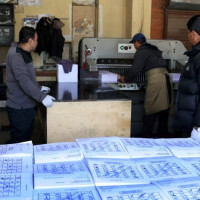- Saturday, 14 February 2026
Ensure Laws Are Implemented
Nepal embraces the federal democratic polity according to the provisions of the Constitution of Nepal 2015. The state has been restructured into three tiers with federal, provincial and local -functioning to execute their exclusive mandates and competencies. The salient characteristics of Nepal’s trysts with federalism have been the secure and entrenched position of the local government. The local municipal governments have been endowed with constitutional mandates to deliver governance and development through executive and legislative authority. In this dispensation, where separation of power has been the authoritative norm, lawmaking prerogative resides in the legislatures of the federal, provincial and local governments, while implementation of the laws enacted by the legislative authorities is carried out by the executive organ of the government.
Parliament enacts laws as the representative institution of the people. But if the legislative body is not mindful and strong enough to keep vigil over the application of laws, many of the legislations formulated by the parliament gather dust without being implemented by the executive organ of the government. In Nepal’s case, the law-making process at the federal, provincial, and local level is beset with several weaknesses and shortcomings, which, among others, include the shelving of legislative bills for long without due discussion and deliberation. This leads to their loss of relevance and legitimacy.
Resentment
Over a dozen bills have been invalidated, made irrelevant in the last Parliament as the House had failed to discuss and ensure their passage in due time. Due to this reason, the School Education Bill has been lying pending in the national parliament. This has resulted in massive resentment and outrage among the teachers, which has manifested in large-scale protests and demonstrations. Reeling under the pressure of a massive strike launched by the teachers, the government has committed to enacting the School Education Act in the ongoing session of the parliament. Another problem confronted today has been that most of the laws and legislations passed by the federal and provincial parliaments have gone unimplemented, failing to fulfill the purposes they were enacted.
This shows the ineffectiveness of the parliaments, both at the federal, provincial, and local levels, elected according to the provisions of the federal constitution. Parliaments devote a large part of their human and financial resources to the process of lawmaking. Law application and enforcement are indeed a complex matter. It depends on the utilisation of ideas, expertise, resources, and the collaborative role of different actors, as well as their commitment to the spirit and values enshrined in the legislation. Similarly, it also demands full-fledged coordination and cooperation among all actors and stakeholders involved. In fact, the application of laws does not happen automatically immediately after their enactment. Several aspects can affect the course of the application.
The factors affecting the application of laws include changes in facts on the ground, diversion of resources, deflection of goals, resistance from stakeholders and implementing actors and so on. Furthermore, implementation of legislation and policies may also be undermined by power asymmetries, exclusion, and state capture by vested interests and well-entrenched clientelism. Despite these hindering factors, according to a resource book produced by UK-based Westminster Foundation for democracy (WFD), some overarching reasons give rise to imperatives as to why legislatures should take upon the responsibility to monitor and scrutinise the implementation of legislation and hold the government to account if implementation is not accorded due attention and priority.
Parliaments should assess the implementation of laws to ensure the requirements of democratic governance and legal certainty, and ascertain barriers that adversely affect their application. This process is called post-legislative scrutiny (PLS), which is needed to support a consolidated system of appraisal for assessing how effective a law is at regulating and responding to problems, issues and events. Moreover, the scrutiny is also necessary to effect and support improvements in legislative quality by learning from experience, both in terms of what works and what does not.
Post-Legislative Scrutiny, according to the WFD resource book, is also required to look at whether the legal provisions of the law have been brought into force, how courts have interpreted the law and how legal practitioners and citizens have used the law. Post-Legislative Scrutiny thus looks at the impact of legislation, whether the intended policy objectives of the law have been met, with special focus on effectiveness. When analysing the impact of legislation, one needs to consider the cumulative effect of legislation, as well as how the state of affairs within a policy area has been shaped by different pieces of legislation.
Legislative impact
Legislative impact is rarely the effect of one single piece of legislation. Hence, it is useful to consider the cumulative effects of the legislative products concerned. Acts of Parliament often grant ministries of the government powers to make delegated or secondary legislation. It is very important to review secondary or delegated legislation at the same time as reviewing the parent legislation from which it owes its authority. This is particularly the case in Nepal, where delegation legislations formulated by the ministries hold most of the provisions to give effect to primary legislation.
Parliamentary committees at federal, provincial, and local levels should therefore take on the task of scrutinizing the effects of specific secondary legislation, especially to look at their crosscutting impacts. Particularly interesting topics to look at during the post-legislative scrutiny could be gender or human rights, regulatory or environmental burdens. The parliaments, irrespective of levels, must give serious thought to conducting post-legislative scrutiny to ensure that the lawmaking function they undertake becomes useful and produces intended results. In this regard, assistance from research organisations and think tank bodies can become instrumental and helpful in this regard.
(The author is presently associated with Policy Research Institute (PRI) as a senior research fellow. rijalmukti@gmail.com)









-original-thumb.jpg)







